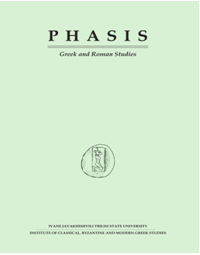Γλωσσική υποχώρηση και γλωσσική επιβίωση. Το παράδειγμα των ιδιωμάτων της Βιθυνίας
DOI:
https://doi.org/10.60131/phasis.17.2014.2338Abstract
The present paper discusses the dialects of a part of Bithynia, Asia Minor, in an effort to report on the way in which the evolutionary process of the area’s dialects was affected by the peculiar multinational environment first of Asia Minor and later of Greece. In this context we present the sociolinguistic parameters that have affected the aforementioned dialects so as to show how and for what reasons language resists in unfavourable linguistic environments and under adverse sociohistorical circumstances (Asia Minor – Ottoman environment). Next, we examine to what extent and how the creation of the Greek state and the "unified national language" in the 19th century affected the course of the evolution of these dialects in Asia Minor, and lastly, we explore how language resistance mechanisms are inactivated in a theoretically "friendlier" linguistic environment, such as that of the Greek territory in this case. It should be noted that the age-old evolution of these dialects in Asia Minor was interrupted due to their users’ emigration and dispersal in Greece in 1922. The dialects of Bithynia followed the downward course of all language varieties that strive to coexist with the current "official national language." The conditions of their attenuation acted somewhat deterministically in the context of the frequently problematic rationale of an assimilative national policy. Today, once again, in the new globalized society, similar pressures are exerted to form a unified language as a tool of communication and not of expression, and subsequently to impose a kind of "monolingualism." However, outside and beyond any form of ethno-romantic nostalgia, it is necessary and imperative to encourage the maintenance of linguistic diversity, as it is connected with two basic needs: (a) on the one hand the ability of the speaker, in language practice, to draw elements from more than one languages or varieties without being stigmatized by negative attitudes and feelings of inferiority and disparagement concerning his/her mother tongue, and (b) on the other hand the need to be tuned in to a more general demand of advanced societies, which is now a political one, namely the self-evident protection of their citizens’ right to identity determination choices.
Downloads
Published
Issue
Section
License
Copyright (c) 2014 PHASIS

This work is licensed under a Creative Commons Attribution-NonCommercial 4.0 International License.


